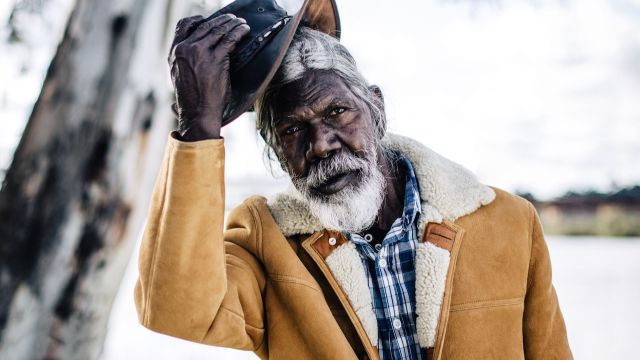My Name is Gulpilil
My Name is Gulpilil is a truly extraordinary experience and achievement. In classical terms it is a ‘contemplation’ – a mediation about an action that is yet to happen; in this case the death of one of Australia’s greatest Indigenous actors, David Gulpilil.
David Gulpilil Ridjimiraril Dalaithngu, AM, was born in 1953, a member of the Yolngu people from norther-eastern Arnhem Land. At the age of 14 he was catapulted to international attention and acclaim through his stunning film debut in Nicholas Roeg’s Walkabout (1971). Subsequently, he has appeared in over 20 films and 12 television productions, including Storm Boy (1976), The Last Wave (1977), Crocodile Dundee (1986), The Tracker (2002), Rabbit-Proof Fence (2002), The Proposition (2005), Ten Canoes (2006), and Charlies’s Country (2014). For many he is ‘the face’ of Australia, or at least tribal Indigenous Australia. He has that unique quality and ability that only very few screen actors possess – a hypnotic charisma; whenever he is on-screen you watch no one else except David Gulpilil.
In 2017 David Gulpilil was diagnosed with an incurable cancer. It is somewhat a miracle that he is still alive – a testament to his vital spirit as well as to the carers who are currently looking after him.
This film, produced by long-time collaborators Peter Djigirr and Rolf de Heer, superbly and sensitively directed by Molly Reynolds, with effective editing by Tania Nehme, is not so much about David Gulpilil’s acting career but more about his coming to terms with his own death. It is a film full of pathos, paradoxes, and startling contrasts; it is also extremely and profoundly moving.
From his current suburban home in Murray Bridge, where he is cared for by the wonderful Mary Reynolds, the highlight of his day is to shuffle down to the mailbox. This, and his life in essentially ‘white’ suburban Australia, stands in stark and brutal contrast with this past life as an Indigenous Australian actor and dancer.
The respective selected films and stage appearances are presented chronologically as a kind of ‘flash-back’. David Gulpilil reflects on these films, but any sentiment is kept firmly in check. The only time that he seems profoundly moved to tears is when he visits one of the locations for The Tracker. In regard to his acting talent and skills he acquaints it more with his dancing. This is insightful and partly accounts for his incredible physical presence on-screen. Furthermore, as he states, he is always true to himself – a tribal Yolngu man. Not for him are the roles of ‘middle-class’ and ‘Town’ Indigenous Australian characters. He belongs to the land and it is a deeply spiritual connection that we all feel, acknowledge, and are grateful for; he was an still is a trailblazer for all other Indigenous actors. That his legacy now embraces for others ‘urban’ Indigenous characters is something to be applauded; he, however, will always be of the land, the land that he generously and sagely states is for both ‘black’ and ‘white’ Australians.
Tony Knight
Subscribe to our E-Newsletter, buy our latest print edition or find a Performing Arts book at Book Nook.

